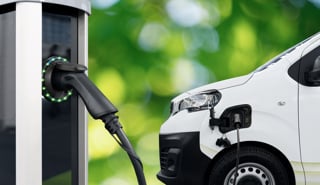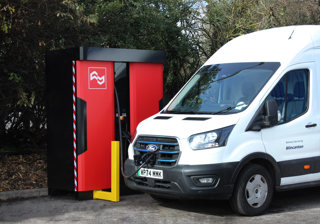It will be crucial for the new Government to hold its nerve on the 2030 and 2050 deadlines and avoid introducing policies or taxation changes that risk deterring companies from making the transition to electric.
That’s the view of Matt Walters, head of consultancy services at LeasePlan, who said: “If they raise tax too quickly on electric vehicles, it will create a pause on fleet transition and that will result in higher emissions.”
In particular, he urged Government “not to touch the plug-in van grant” because it was vital for total cost of ownership modelling due to high list prices and low discounts.
Speaking to Fleet News at Fleet & Mobility Live, Walters added: “There are concerns over benefit-in-kind, lead times and list prices, but we have to invest in the infrastructure and continue with a low tax policy.”
In 2030, manufacturers will no longer be permitted to sell new petrol and diesel cars and vans, while 2050 is the deadline for achieving net zero greenhouse gas emissions in the UK. Many corporate fleets have committed to an electric-only policy for cars and vans by 2025, but other companies have not started to consider them.
Amidst multiple policy announcements over the past year, uncertainty still remains, with a lack of detail about timings and processes announced by ministers.
“We need more concrete planning, such as interoperability, tariff controls and reliability targets for charge point operators, but when is it all happening?” Walters asked.
“The Government said we will have a ZE mandate – but what does it look like and when is it coming?
“We want clarity on the BIK rates – the noise from Treasury is 10% but in stages – but what are the steps?”
Lead times are forcing some companies to compromise on the speed of their EV transition plans, while smaller organisations are struggling to get in the queue, especially for light commercial vehicles.
Nevertheless, Walters believes most companies are at least thinking about electric vehicles and he points to a “trickle up effect” from suppliers who will only be able to work with larger corporates if they can show they have an EV plan.
One outcome from the lack of supply is to give some companies breathing space to “put plans in place to go straight to EV – or, if they have to introduce plug-in hybrid (PHEV), it will be a short cycle contract”.
“The vast majority are not introducing plug-in hybrid; they want full electric,” Walters said. “They see PHEV as more of a compromise, although we are seeing the EV range evolve. But R&D budgets are going into the batter electric space.”
LeasePlan is seeing cash takers move back into company schemes due to the attractiveness of the tax position on electric vehicles. As a result, Walters believes the reduction in tax receipts recently reported by HMRC is likely to be “a blip” because the UK fleet size will grow over the next couple of years, “as long as the Government holds its nerve”.
























Login to comment
Comments
No comments have been made yet.